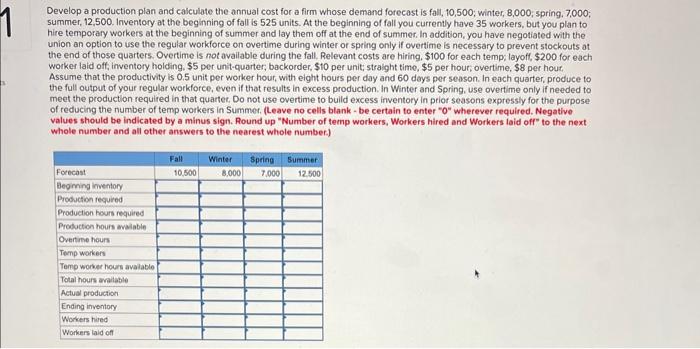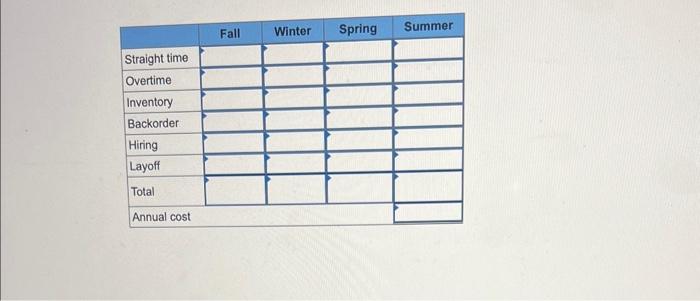Develop a production plan and calculate the annual cost for a firm whose demand forecast is fall, 10,500; winter, 8,000; spring, 7,000; summer, 12,500. Inventory at the beginning of fall is 525 units. At the beginning of fall you currently have 35 workers, but you plan to hire temporary workers at the beginning of summer and lay them off at the end of summer. In addition, you have negotiated with the union an option to use the regular workforce on overtime during winter or spring only if overtime is necessary to prevent stockouts at the end of those quarters. Overtime is not available during the fall. Relevant costs are hiring, $100 for each temp; layoff, $200 for each worker laid off, inventory holding, $5 per unit-quarter, backorder, $10 per unit; straight time, $5 per hour, overtime, $8 per hour, Assume that the productivity is 0.5 unit per worker hour, with eight hours per day and 60 days per season. In each quarter, produce to the full output of your regular workforce, even if that results in excess production. In Winter and Spring, use overtime only if needed to meet the production required in that quartec. Do not use overtime to build excess inventory in prior seasons expressly for the purpose of reducing the number of temp workers in Summer. (Leave no cells blank - be certain to enter " 0 " wherever required. Negative values should be indicated by a minus sign. Round up "Number of temp workers, Workers hired and Workers laid off" to the next Whole number and all other answers to the nearest whole number.) \begin{tabular}{|l|l|l|l|l|} \hline & \multicolumn{1}{|c|}{ Fall } & Winter & Spring \\ \hline Straight time & & & & Summer \\ \hline Overtime & & & & \\ \hline Inventory & & & & \\ \hline Backorder & & & & \\ \hline Hiring & & & \\ \hline Layoff & & & \\ \hline Total & & & \\ \hline Annual cost & & & \\ \hline \end{tabular} Develop a production plan and calculate the annual cost for a firm whose demand forecast is fall, 10,500; winter, 8,000; spring, 7,000; summer, 12,500. Inventory at the beginning of fall is 525 units. At the beginning of fall you currently have 35 workers, but you plan to hire temporary workers at the beginning of summer and lay them off at the end of summer. In addition, you have negotiated with the union an option to use the regular workforce on overtime during winter or spring only if overtime is necessary to prevent stockouts at the end of those quarters. Overtime is not available during the fall. Relevant costs are hiring, $100 for each temp; layoff, $200 for each worker laid off, inventory holding, $5 per unit-quarter, backorder, $10 per unit; straight time, $5 per hour, overtime, $8 per hour, Assume that the productivity is 0.5 unit per worker hour, with eight hours per day and 60 days per season. In each quarter, produce to the full output of your regular workforce, even if that results in excess production. In Winter and Spring, use overtime only if needed to meet the production required in that quartec. Do not use overtime to build excess inventory in prior seasons expressly for the purpose of reducing the number of temp workers in Summer. (Leave no cells blank - be certain to enter " 0 " wherever required. Negative values should be indicated by a minus sign. Round up "Number of temp workers, Workers hired and Workers laid off" to the next Whole number and all other answers to the nearest whole number.) \begin{tabular}{|l|l|l|l|l|} \hline & \multicolumn{1}{|c|}{ Fall } & Winter & Spring \\ \hline Straight time & & & & Summer \\ \hline Overtime & & & & \\ \hline Inventory & & & & \\ \hline Backorder & & & & \\ \hline Hiring & & & \\ \hline Layoff & & & \\ \hline Total & & & \\ \hline Annual cost & & & \\ \hline \end{tabular}








